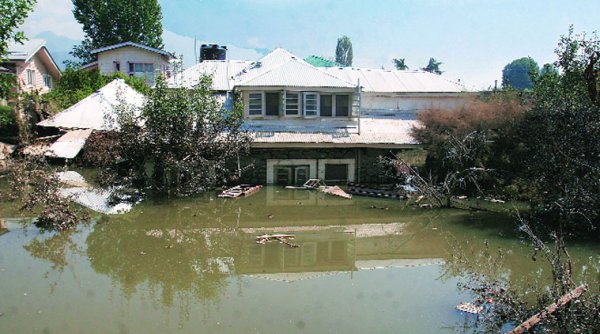
The Jhelum flowed through many of Kashmiri poet Agha Shahid Ali’s poems. “When I return, the colours won’t be so brilliant, the Jhelum’s waters so clean, so ultramarine. My love so overexposed”, he wrote. Shahid’s home, his wooden desk, a rocking chair, books and papers are now under Jhelum waters.
This hut of a house of two floors, lower than the nearby road, and nestled in a wild garden in Rajbagh had become the international address for Kashmir’s literary scene. Shahid, who brought into focus Kashmir’s tumult through his poems, grew up here. He later kept returning from the US where he taught at Amherst College till his death in 2001.
A piece of old architecture, this house was Shahid’s last memory in his home city. Its rooms and the hundreds of documents, photographs and books they contained were a reminder of the poet who introduced the ghazal form to English. Today all is submerged and probably destroyed. When Shahid’s father Agha Ashraf Ali was rescued from the house in a rush, nothing else could be saved.
While the deluge has ravaged Srinagar’s roads, buildings and homes, it has also taken away something more precious — invaluable parts of Kashmir’s history and culture. Flood waters have entered the government archives, cultural academy, the building housing Srinagar’s museum and several other libraries. The flood has also destroyed scores of private collections of texts, rare religious manuscripts, letters and other important connection to Kashmir’s past.
A mile from Shahid’s home, the Valley’s best known artist Masood Hussain said he could only save his latest work: seven paintings based on Shahid’s seven couplets that he had promised the poet before his death. “When the flood came, it submerged everything in my neighbourhood,’’ Hussain said. “My brother had two rubber boats but in those hours of crisis, I forgot everything and helped rescue some 40 people. Several houses around my home collapsed.”
A Kashmiri journalist had a 250-year-old copy of the Quran that had been passed from generations in his family. He could not take it out when the flood rushed into his house in Rajbagh. A resident of Tulsibagh had letters from 1890, documenting those times, preserved in his home. They are gone too.
Idrees Kanth, who is researching Kashmir’s social history for his PhD at Leiden University in Amsterdam, said the loss is irreparable. “Many people in Kashmir had private archives. The sudden onset of flood left them no chance to save the precious material, Kanth said. “It’s not just lives and property we have lost, we have lost a part of our history too.”
He said he was praying the government’s archives are safe. “There are 20 lakh files in the archives, which aren’t even indexed. We may never know what has been lost in these floods.”
Director of archives, Mohammad Shafi Zahid told The Indian Express, that the archives are safe. “The flood water has submerged the low lying building but not the one where our archives are housed,’’ he said. “The papers are all safe.”
The archives house old Kashmiri, Persian and Arabic manuscripts which are important for their religious, philosophical and literary value. The building also houses old land records, state subject documents, bureaucratic correspondence of J&K State since the Maharaja’s times among other papers. However, Saima Iqbal of Indian National Trust For Art and Cultural Heritage said she was not allowed into the archives to check.
source: http://www.indianexpress.com / The Indian Express / Home> India> India-Others / by Muzamil Jaleel / Srinagar – September 23rd, 2014








